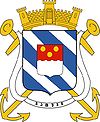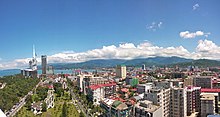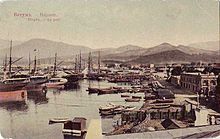Batumi
|
Batumi ბათუმი |
|||
|
|||
| State : |
|
||
| Region : |
|
||
| Coordinates : | 41 ° 39 ′ N , 41 ° 39 ′ E | ||
| Height : | 2-3 m. ü. M. | ||
| Area : | 64.9 km² | ||
| Residents : | 152,839 (2014) | ||
| Population density : | 2,355 inhabitants per km² | ||
| Time zone : | Georgian Time (UTC + 4) | ||
| Postal code : | 6010 | ||
| Mayor : | Lasha Komachidze | ||
| Website : | |||
|
|
|||
Batumi ( Georgian ბათუმი ) is a port city on the Black Sea . As the capital of the Adjara region in southwest Georgia , it has 152,839 inhabitants (2014), making it the second largest city in the country. Batumi is the seat of a diocese of the Georgian Orthodox Church and a science location with colleges, universities, naval faculty and agricultural institute.
Location and traffic
The city center is only 18 km from the Turkish border. The road connection to the south-western neighboring country via the Sarpi / Sarp border crossing is very busy. There are bus connections to Rize, 130 km away, and Trabzon , 205 km away .
Batumi is connected to the Georgian railway network. The route to Batumi is also mainly used to transport oil, mainly from Azerbaijan to the Black Sea. However, there is a passenger train connection with Tbilisi two to three times a day, with a journey time of around five hours. In addition, a pair of regional trains runs daily to Kutaisi and an electric train to Osurgeti (as of February 2017). The passenger station in Batumi is located in the Machindschauri district seven kilometers from the city center (incorporated in 2011).
Batumi International Airport is six kilometers southwest of the city center.
Batumi is the main port in Georgia today. It offers space for the handling of 80,000-ton tankers. The oil from Azerbaijan is refined near the port and shipped from there. Oil exports from Kazakhstan and Turkmenistan are also handled in Batumi. The city also exports regional agricultural products such as tea and citrus fruits. The port's freight turnover has increased steadily since 1995. In 2001 it was around eight million tons per year. Government revenue from the port is estimated to be between $ 200 million and $ 300 million annually.
Ferry connections from Batumi exist to Chornomorsk (near Odessa , Ukraine ), Sochi in Russia and Poti in Georgia. With the conversion of Poti Airport into an aviation hub in the Caucasus region, the coastal region around Batumi is to be promoted.
geography
Batumi is located on a flat peninsula near the mouth of the Chorochi River in the Black Sea. The city is enclosed by steep ranges of hills, which lie in the apron of the Lesser Caucasus . The suburbs of the city with old wooden houses and prefabricated housing estates were built into the hills, while the old town borders the sea.
Demographics
The population composition of Batumi has changed massively again and again over the past centuries. After the city came under Russian control in the 19th century, the proportion of Russians living in Batumi increased sharply. At the same time, many Armenians and other population groups from the Russian Empire also settled there.
In 1886 Batumi had around 14,800 inhabitants. Of these, 23.4% were Armenians, 20.1% Greeks , 17% Georgians (and Mingrelians ), 11.2% Russians , 8.4% Turks , 6.3% Jews (mainly Ashkenazim , some Georgian Jews ) and 3, 7% were Abkhazians .
During the 20th century, the Georgian population increased steadily. The 1939 Soviet census found a population of around 70,000, of which 41% Georgians, 29.1% Russians, 17.2% Armenians, 5.5% Greeks and 2.5% Jews. There were also small communities of Kurds (0.5%), Russian Germans (0.3%) and Assyrians (0.3%).
From the second half of the 20th century, more and more Russians and members of other minorities left the city. When the Soviet Union fell apart and Georgia became independent, there was yet another large wave of non-Georgian residents from all over Georgia. As a result, Batumi's population fell from 136,609 in the last Soviet Union census in 1989 to 121,806 in the 2002 census. 85.64% of them were Georgians, 6.17% Armenians, 5.17% Russians, 0.66% Abkhazians, 0.63 % Ukrainians and 0.48% Greeks. There were also several other, smaller minorities, such as Ossetians and Azerbaijanis.
As a result of extensive incorporations on January 1, 2013, the population of the city rose to 152,839 by 2014, which means a continued slight decrease compared to the value of 2002 in relation to the new city limits (155,176).
- Population development

Note: census data. 2013 part of the municipality of Chelvachauri incorporated.
history
Batumi was founded as a colony in ancient Greece under the name of Batis . It is derived from the Greek words bathis limin and means deep harbor . In 1564 the then Gurian city was annexed by the Ottoman Empire and after the Russo-Ottoman War it was annexed to Russia with the Treaty of Berlin in 1878 . In 1901 Josef Stalin organized strikes in Batumi. After the peace treaty of Brest-Litovsk , the city was first part of Turkey in April 1918 and then occupied by Great Britain for 19 months in December . After the conclusion of the Orient Treaty between Soviet Russia and Turkey, Batumi fell to Georgia on March 18, 1921 and thus to the later Soviet Union and became the capital of Ajaria.
As early as the 1870s, Batumi was an important export port for wool , cotton , wood , silk cocoons and manganese . Since 1883 the city has also been an important transshipment point for crude oil after it was connected to the Poti – Baku railway line . The Georgian railway and a pipeline bring crude oil and petroleum products from Baku, Azerbaijan, on the Caspian Sea .
present
Since the change of power in Adjara in 2004, Batumi has attracted international investors . Companies from Kazakhstan, Azerbaijan and Turkey built new hotel complexes. The beach promenade is being renovated and expanded from 800 meters to 5000 meters. Property prices in the city have more than tripled since then.
The 12th military base of the Group of the Russian Armed Forces in Transcaucasia (GRVZ) was stationed in Batumi until November 2007 . Up to 2004, 70% of the soldiers had dual Russian-Georgian citizenship, after which they were exchanged for purely Russian citizens. In 2006 some of the vehicles and weapons were removed from the base.
In July 2007, the Georgian Constitutional Court moved its seat from Tbilisi to Batumi.
By resolution of July 15, 2011 and with effect from January 1, 2013, 16 villages with a total of 33,370 inhabitants on an area of 46 km² of the municipality of Chelwachauri surrounding the city were incorporated into Batumi, increasing the city's population by more than a quarter, the area more than tripled and Kutaisi, Georgia's second largest city in terms of inhabitants, was overtaken. The incorporated places include the former minority Chelwatschauri (seat of the municipality of the same name) and several seaside resorts north (Mzwane Konzchi and the former minority Machindschauri) and south of the center ( Gonio and Kwariati ).
climate
The Air Batumi is subtropical . The average annual temperature is 14 degrees Celsius. The warmest months are July and August with an average temperature of 22 degrees Celsius. The lowest recorded temperature in Batumi was −7 degrees Celsius, the highest 40 degrees Celsius.
The annual rainfall is 2500 mm. The wettest month is January with around 20 days of rain. The driest month is May with 15 days without any rain. Palm trees , cypresses , magnolias , oleanders, lemon and orange trees grow in the city .
| Batumi | ||||||||||||||||||||||||||||||||||||||||||||||||
|---|---|---|---|---|---|---|---|---|---|---|---|---|---|---|---|---|---|---|---|---|---|---|---|---|---|---|---|---|---|---|---|---|---|---|---|---|---|---|---|---|---|---|---|---|---|---|---|---|
| Climate diagram | ||||||||||||||||||||||||||||||||||||||||||||||||
| ||||||||||||||||||||||||||||||||||||||||||||||||
|
Average monthly temperatures and rainfall for Batumi
Source: wetterkontor.de
|
|||||||||||||||||||||||||||||||||||||||||||||||||||||||||||||||||||||||||||||||||||||||||||||||||||||||||||||||||||||||||||||||||||||||||||||||||||||||||||||||||||||||||||||||||||||||||||||||||||
Attractions
The 800 meter long, palm-lined Primorski Boulevard on the beach of the Black Sea is famous . Palaces and casinos belonging to US hotel groups are lined up there. The Ajarian State Museum displays treasures from ancient Greece , including a Colchian bronze crown, vases and jewelry made of gold and silver.
In the north of the city, on the Green Cape , is the Batumis Botanical Garden . It offers a dendrological collection with 3,270 tree species on 114 hectares. The terraces on the steep coast offer spectacular views over the Bay of Batumi.
The aquarium south of Batumi is home to over 100 species of fish. The dolphinarium shows trained black sea dolphin (Tursiops truncatus ponticus), an endangered subspecies of the bottlenose dolphin .
A popular destination is Gonio , a late Roman fortress about ten kilometers south of Batumi. The facilities are well preserved and the walls can be climbed. Furthermore, the Mtirala National Park is in the immediate vicinity of the city.
In July 2007 the Medea memorial was inaugurated on Freedom Square in the center of the old town of Batumi . It is reminiscent of the famous Greek legend of the Golden Fleece and at the same time symbolizes Georgia's historical claim to this part of the Black Sea coast.
Education, culture and sport
There are three universities in Batumi, including the Shota Rustaveli State University . There is also an art college and a naval academy. There are also numerous theaters and museums in the city.
FC Dinamo Batumi , based in the city, plays in the country's highest league, the Erovnuli Liga . Between 2018 and 2020, a new football stadium and venue for FC Dinamo was built after the old Batumi central stadium was no longer usable in 2006. The Batumi Stadium has 20,035 seats.
City administration
mayor
Lascha Komachidze from the Georgian Dream party alliance had been mayor since the end of 2017 , until his resignation in July 2020. He replaced Giorgi Yermakov, who was in office from August 2, 2014, on Murman Beridze of the United, who was appointed by then President Mikheil Saakashvili to the office National movement followed. In a criminal case involving seven defendants, most of whom were vice ministers of the Saakashvili era, Yermakov was sentenced to 7 years in prison for embezzlement in January 2020.
Twin cities
The city of Batumi mentions as its thirty twin cities :
| city | country | since |
|---|---|---|
|
Altınordu (Ordu) |
|
2010 |
|
Ashdod |
|
2012 |
|
Bari |
|
1987 |
|
Brest |
|
2015 |
|
Burgas |
|
2009 |
|
Daugavpils |
|
2012 |
|
Donetsk |
|
2013 |
|
Donostia-San Sebastian |
|
1987 |
|
Yalta |
Autonomous Republic of Crimea , Ukraine / Russia |
2008 |
|
Jurmala |
|
2014 |
|
Kislovodsk |
|
1997 |
| Kuşadası |
|
2010 |
|
Marbella |
|
2010 |
|
Naxçıvan |
|
2012 |
|
Netanya |
|
2018 |
|
New Orleans |
|
2012 |
|
Nysa |
|
2017 |
| Paphos |
|
2016 |
| Piraeus |
|
1996 |
|
Prague, administrative district 1 |
|
2013 |
|
Rostock |
|
2012 |
| Savannah |
|
1992 |
| Sharm El Sheikh (El Sheikh) |
|
2014 |
|
Ternopil |
|
2011 |
|
Trabzon |
|
2000 |
| Urumqi (Urumchi) |
|
2015 |
|
Verona |
|
2010 |
|
Volos |
|
2007 |
|
Vanadzor |
|
2006 |
| Yalova |
|
2012 |
Annotation:
- ↑ is located in the autonomous republic of Crimea , whose affiliation between Ukraine and Russia is unclear
Personalities
sons and daughters of the town
- Herbert Backe (1896–1947), German Nazi politician
- Grigori Mairanowski (1899–1971), Soviet chemist and toxicologist
- Aschot Mndojantsch (1910–1966), Soviet architect
- Aramaschot Papajan (* 1911), writer
- Joannis Avramidis (1922–2016), Greek-Austrian sculptor
- Arkadi Strugazki (1925–1991), Soviet-Russian English studies specialist, Japanologist and science fiction author
- Rostom Abashidze (* 1935), wrestler
- Vladimir Bagirow (1936-2000), Soviet-Azerbaijani chess player
- Dawit Gwanzeladze (1937-1984), wrestler
- Aslan Abashidze (* 1938), politician
- Janri Kaschia (1939–2012), journalist
- Ansor Kawasashvili (* 1940), football player
- Sarkis Sarchajan (* 1947), Soviet-Armenian table tennis player
- Fyodor Yurtschichin (* 1959), Russian cosmonaut
- Valery Meladze (* 1965), Russian singer and actor of Georgian origin
- Levan Warschalomidze (* 1972), politician
- Irakli Alassania (* 1973), politician
- Muchran Vakhtangadze (* 1973), wrestler
- Nona Zozoria (* 1973), lawyer
- Dawit Bedinadze (* 1985), wrestler, world champion 2007
- Guram Perselidze (* 1985), wrestler
- Sopo Chalwaschi (* 1986), singer
- Khatia Buniatishvili (* 1987), Georgian-French pianist
- Salome Melia (* 1987), chess player
- Miranda Mikadze (* 1989), chess player
Persons connected to Batumi
- Katie Melua (* 1984), Georgian-British singer and musician
- Recep Tayyip Erdoğan (* 1954), Turkish politician
See also
Individual evidence
- ↑ Population Census 2014 ( Memento from September 20, 2016 in the Internet Archive )
- ↑ Timetable of the Sakartwelos Rkinigsa , accessed on April 25, 2014
- ↑ http://www.ethno-kavkaz.narod.ru/rngeorgia.html
- ↑ http://upload.wikimedia.org/wikipedia/commons/9/92/Georgia_Census_2002-_Ethnic_group_by_major_administrative-territorial_units.pdf
- ↑ constcourt.ge ( Memento from July 21, 2011 in the Internet Archive )
- ↑ Batumi Stadium. In: stadiumdb.com. Retrieved July 6, 2020 .
- ↑ Website Batumi - English Version , accessed on November 11, 2016
- ↑ [1] (2020-01-27).
- ↑ Website of the city of Batumi - German version: Sister Cities , accessed on November 11, 2016
- ↑ ჩვენი ქალაქი - დამეგობრებული ქალაქები - ქალაქ ბათუმის მერია. Retrieved December 4, 2019 .










